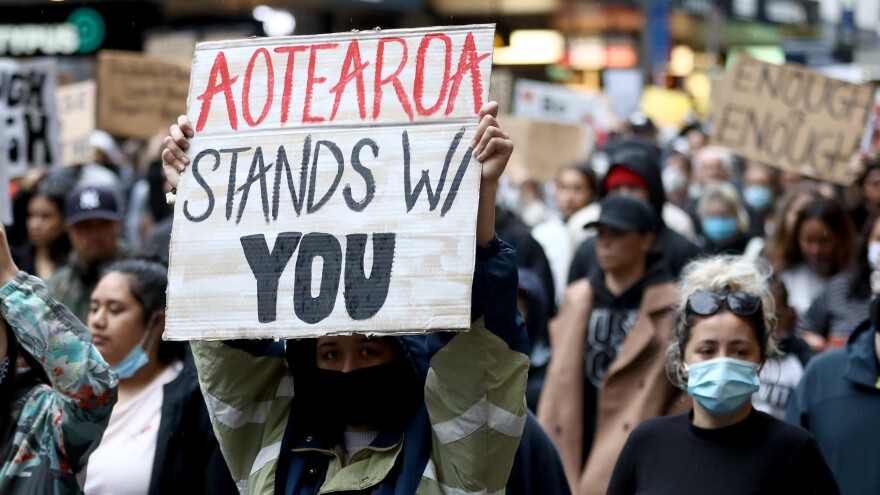Although New Zealand is about as far — in miles, at least — as you can get from Minneapolis, protests have erupted there over the killing of George Floyd. The Indigenous Maoripeople in particular have pushed back against police use of force, which disproportionately affects them.
At first glance, the context seems quite different. New Zealand police don't usually carry firearms. The reason goes back to the 19th century British aversion to creating a police force too much like a military. In general, if New Zealand police officers need to use a gun, there is one in a lockbox in their car that they can use with a supervisor's permission.
But after a white nationalist gunned down 51 people in two mosques last March in Christchurch, New Zealand's police introduced a pilot program to send heavily armed police teams on patrol in three communities. One of these communities was around Christchurch. The other two were far away in counties near the city of Auckland. The police said it would enable them to respond more quickly to violent crime.
Julia Amua Whaipooti, a Maorilawyer and activist in Wellington, received the police announcement with fear. Both of the communities near Auckland that were selected for armed patrols had large populations of Maori and Pacific Islanders, another minority community in New Zealand.
Even though the perpetrator of the crime that inspired the pilot program was white, "it's predominantly brown communities [they're patrolling]," she says.
"We are on the precipice of heading towards an Americanization of our policing."
Whaipooti and other activists have been fighting the program since its announcement last fall. They filed a legal claim that it was in breach of the treaty first signed between Maori chiefs and the British crown in 1840.
Maori and Pacific people make up about 25% of New Zealand's population. But in the last decade, 66% of people shot by police have been members of the Maori and Pacific Islander communities, according to advocates and news reports.Maori and Pacific people are also more likely to be tasered and pepper-sprayed than white New Zealanders.
Whaipooti says that the George Floyd protests have resonated with Maori because they've experienced similar issues of racial bias.
Even the police association has agreed that there has been "institutional bias" in how officers interact with Maori.
"So if we put guns in [police] hands as well to interact with us, that's going to mean lives," Whaipooti argues.
New Zealand's police association defended the program, saying no officer fired a single shot during the six-month pilot, and insisting that its goal is to protect these communities from violent crime.
But, following Floyd's killing last month, the hashtag #ArmsDownNZ trended to No. 1 on Twitter in New Zealand. When questioned about the movement on national radio,Prime Minister Jacinda Ardern said she opposed the routine arming of police.
Then, this week, New Zealand Police Commissioner Andrew Coster announced he is not extending the pilot program and said he's committed to keeping New Zealand cops unarmed.
Coster attributed his decision to public feedback and consultation with community groups. "It is clear to me that these response teams do not align with the style of policing that New Zealanders expect," he said.
Though Coster did not reference the recent protests over police brutality against people of color, Whaipooti believes that the Arms Down New Zealand campaign might not have succeeded without the U.S. demonstrations.
"The power and impact of George Floyd, whose life was stolen so violently and so brutally," she says, "I owe a big duty to that man, because that means he has saved lives of Maori people in this country."
Copyright 2020 NPR. To see more, visit https://www.npr.org. 9(MDAxODg3MTg0MDEyMTg2NTY3OTI5YTI3ZA004))




